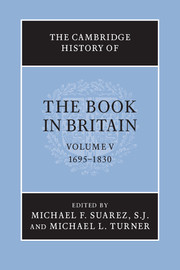Book contents
- Frontmatter
- Introduction
- PART I THE QUANTITY AND NATURE OF PRINTED MATTER
- PART II ECONOMIC, LEGAL AND CULTURAL CONTEXTS
- PART III THE TECHNOLOGIES AND AESTHETICS OF BOOK PRODUCTION
- PART IV THE BOOK TRADE AND ITS MARKETS
- V BOOKS AND THEIR READERS
- Abbreviations used in bibliography
- Bibliography
- Index
- Frontispiece
- Plate section
- References
Introduction
Published online by Cambridge University Press: 28 September 2010
- Frontmatter
- Introduction
- PART I THE QUANTITY AND NATURE OF PRINTED MATTER
- PART II ECONOMIC, LEGAL AND CULTURAL CONTEXTS
- PART III THE TECHNOLOGIES AND AESTHETICS OF BOOK PRODUCTION
- PART IV THE BOOK TRADE AND ITS MARKETS
- V BOOKS AND THEIR READERS
- Abbreviations used in bibliography
- Bibliography
- Index
- Frontispiece
- Plate section
- References
Summary
The worldliness of print
This is a book about the worldliness of print in Britain from the final lapse of the Printing Act in 1695 to the thoroughgoing development of publishing as a specialist commercial undertaking and the industrialization of the book in 1830. The collective aim of the forty-nine contributors to this volume is ‘the intrusion of more history’ into the study of books and readers, copyrights and profits, censorship and advertising, technologies and trades – the manifold particulars that condition the pluriform ways in which meanings are made.
This is a book about the history of ‘the book’, a shorthand for any recorded text: catechisms and commodity price currents, encyclopaedias and children’s ABCs, manuscripts and mezzotints, serials and playbills. Just as ‘there cannot be a history of ideas without a history of objects’, so too is there no authentic history of objects without a dedicated effort to recover their makers. And if such a history does not attend to the ever-developing circumstances of production and distribution, to the fugitive testimonies of consumption, then how may it claim a degree of historical legitimacy? Produced and distributed by networks of workers from authors to hawkers, ‘the book’ – and the concomitant cultures forged by its consumers — proved a powerful agent for the construction of communities and corporate identities. Nor was this constitutive power of print limited to the literate: many unlettered persons could listen to a single reader.
- Type
- Chapter
- Information
- The Cambridge History of the Book in Britain , pp. 1 - 36Publisher: Cambridge University PressPrint publication year: 2009
References
- 4
- Cited by

